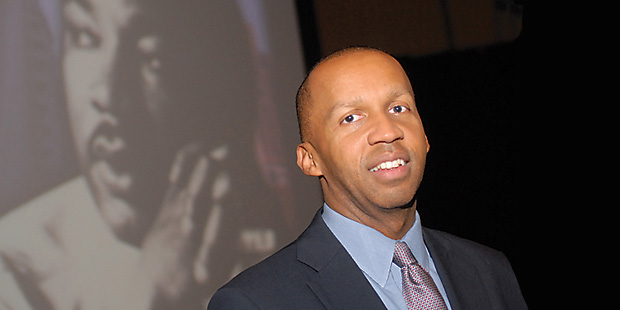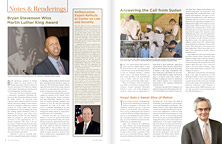Bryan Stevenson Wins Martin Luther King Award
Printer Friendly VersionBryan Stevenson, professor of clinical law, added two more awards to his already impressive collection this year when he took home NYU’s first-ever Martin Luther King Jr. Humanitarian Award as well as its Distinguished Teaching Award.
Stevenson, who lists among his honors a MacArthur Foundation fellowship, the American Bar Association Wisdom Award for Public Service, the American Civil Liberties Union National Medal of Liberty and the American College of Trial Lawyers Award for Courageous Advocacy, teaches courses on racial justice and capital punishment as well as leading the headline- making Capital Defenders Clinic in Alabama. In January 2005, clinic client James Borden became the first Alabama death-row prisoner to have his sentence converted to life imprisonment due to mental retardation. “The clinic is the perfect nexus of legal training and education while helping defendants who are literally dying for representation,” says Stevenson, who believes that “each of us is more than the worst thing we have done.”
Stevenson is also the executive director of the nonprofit Equal Justice Initiative of Alabama, which works on behalf of indigent defendants and prisoners, many on death row. The EJI has succeeded in obtaining relief in the form of new trials, reduced sentences or exoneration for more than 70 death-row prisoners in the past 15 years.
It was Stevenson’s tireless advocacy that caught the attention of the Martin Luther King Jr. Humanitarian Award committee, said Allen McFarlane, assistant vice president for student diversity programs and services at NYU. He said that Stevenson “embod[ied] the work of Dr. King…. We want to recognize individuals in our own community, in our own backyard, who are doing great things related to social justice and diversity in our world today.”
Stevenson was also one of three professors to receive the annual NYU Distinguished Teaching Award in May. The medal and $5,000 grant recognize faculty who have contributed significantly to the intellectual life of the university. Said Vice Provost for Faculty Affairs E. Frances White: “The committee was especially impressed by Bryan’s ability to inspire students to dedicate their lives to helping those marginalized in the criminal justice system.”

